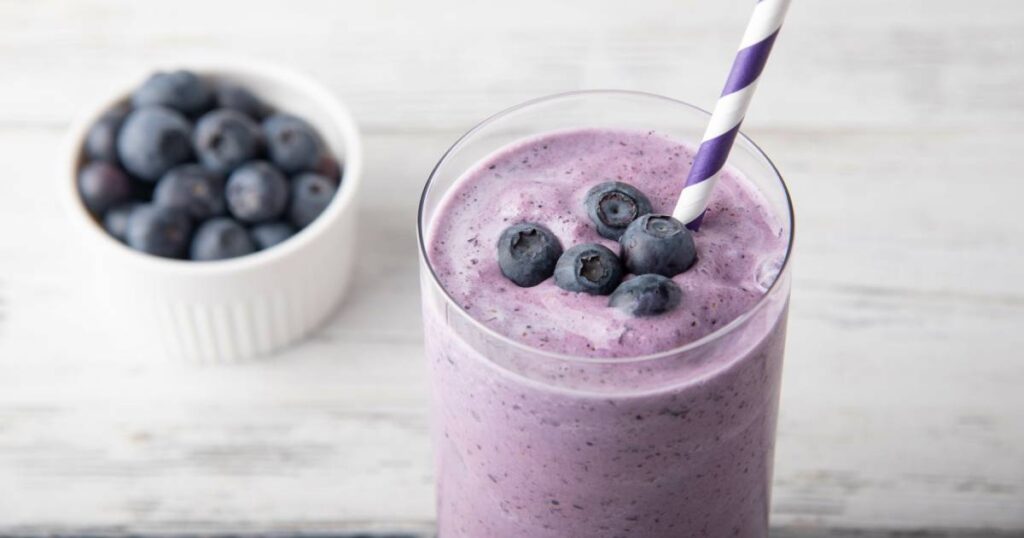Blueberry smoothie recipe and info
Table of Contents
Blueberries are one of the most potent antioxidant-rich foods in the world.
That’s why I love adding them to my smoothies. They add a burst of flavor and color and provide your drink with essential vitamins, minerals, and antioxidants that can kickstart your day like no other ingredient.
Trust me; once you try adding blueberries to your smoothies, you’ll never want to go back.
Why are blueberries a popular ingredient in smoothies
Are you noticing lots of smoothie blueberry recipes? That’s because blueberries offer the following:
– Rich in nutrients: Blueberries are an excellent Vitamin C, K1, and manganese source.
– Low in calories: They add flavor without too many extra calories.
– High in antioxidants: These protect your body from free radicals which damage your cells.
– Convenient: It’s easy to freeze blueberries, so you can have them on hand whenever needed.
Try blending bananas, spinach, and blueberries to create a delicious drink that is also good for you.
But there’s more to it than just health benefits.
Blueberries add natural sweetness to your drinks, so you might not need added sugars or sweeteners. This is great for keeping things healthier.
They also give smoothies a vibrant color that looks amazing on social media posts, when serving guests at home, or if you like pretty purple things like me.
Adding these berries isn’t just about taste or looks; it’s about making smarter food choices easily every day.
Blueberries nutritional information
An average serving of blueberries, about one cup or 148 grams, contains a treasure trove of vitamins and minerals.
First, they’re low in calories but high in fiber, nearly 4 grams per serving. This helps keep you full longer without adding extra calories to your diet.
They’re also rich in vitamins C and K, boosting your immune system and bone health. And blueberries contain a good amount of manganese, essential for bone development and converting carbohydrates and fats into energy.
In addition to these key nutrients, blueberries offer powerful antioxidants known as anthocyanins. These compounds give the berries their vibrant color and protect the body against inflammation and disease.
Incorporating an average serving of blueberries into your smoothies significantly meets your daily nutritional needs while enhancing flavor.
| Nutrient | Amount per Serving | % Daily Value |
|---|---|---|
| Calories | 84 kcal | 4% |
| Protein | 1.1 g | 2% |
| Total Fat | 0.49 g | <1% |
| Saturated Fat | 0.042 g | <1% |
| Carbohydrates | 21.45 g | 7% |
| Dietary Fiber | 3.6 g | 14% |
| Sugars | 14.74 g | – |
| Vitamin C | 14.4 mg | 16% |
| Vitamin K | 28.6 mcg | 24% |
| Manganese | 0.5 mg | 22% |
What ingredients blend well with blueberries
Blueberries are versatile and taste great in smoothies. But what else should you add? What fruits blend well with blueberries? Here’s a list of ingredients that go well with blueberries to make your smoothie delicious.
- Bananas: They add sweetness and creaminess.
- Spinach: For a nutrient boost without changing the flavor much.
- Almond milk: It gives a mild, nutty background taste.
- Greek yogurt: Adds protein and makes your smoothie thicker.
- Dates, honey, or maple syrup: If you like it sweeter.

You can mix these for various flavors.
Try banana and almond milk for a creamy texture. Or for extra health benefits try a spinach with blueberry greek yogurt smoothie.
Check out our mega list of 20+ banana smoothie recipes where you can sub in almond milk for any liquid base.
Remember, balance is key. Too many sweeteners can overpower the natural taste of blueberries. Start with small amounts and adjust to your liking.
Now, let’s talk about making your smoothie even better. Add some chia seeds or flaxseeds for omega-3s. A scoop of protein powder turns it into a filling breakfast option. And remember to use frozen blueberries for that cool, slushy consistency.
Blueberry smoothies recipes
3 Ingredient blueberry smoothie recipe
To make a blueberry smoothie it’s easy. You only need three ingredients:
- Grab 1 cup of frozen blueberries. They make your smoothie cold and thick.
- Add 1 banana for sweetness and texture.
- Pour in 1/2 cup of almond milk or any milk you like.
Blend these together until smooth. If it’s too thick, add more milk slowly until it’s just right for you.
Antioxidant blueberry smoothie recipe
For an antioxidant punch, try this healthy blueberry smoothie recipe:
- Start with 1 cup of blueberries and 1/2 cup of spinach; both are antioxidants.
- Add 1 tablespoon of chia seeds to boost the fiber content.
- Pour in 3/4 cup of orange juice, not from concentrate if possible, for vitamin C.
Blend all ingredients until they’re thoroughly mixed together. Enjoy immediately to get the most benefits from the antioxidants.
Energy boost blueberry smoothie recipe
Need a quick energy boost? This smoothie can help:
- Combine 1 cup of blueberries, known for natural sugars that provide energy without crashing later.
- Throw in half an avocado for healthy fats that fuel your body longer.
- Lastly, mix in one teaspoon of ground flaxseed or MCT oil with one scoop of protein powder (optional)
- Blend with ¾ cup water or almond milk.
This combination gives you a creamy consistency while packing proteins and good fats into your diet, giving you a big energy kick.
Variations/substitutions for blueberries in smoothie recipes
Fruit alternatives
If you’re out of blueberries or just want to try something new, there are plenty of fruits that can take your smoothie game to another level.
Strawberries and raspberries offer a similar berry vibe but with their own unique flavors.
Açaí berry is another great option to substitute for blueberries in a smoothie. These small, dark purple berries are packed with antioxidants, fiber, and heart-healthy omega fats.
The slightly sweet and tart flavor of acai berries also adds a unique taste to your smoothie, making it a refreshing and nutritious treat.
You can easily find açaí berries in frozen packs or powder form at your local grocery store.
Blend them with your favorite fruits and veggies to create a delicious and healthy smoothie that will boost your energy to start your day.
Veggie boosts
Make sure to consider vegetables as an alternative or addition to fruit in your smoothies. Spinach and kale blend well without altering the taste much, especially when mixed with sweet fruits like bananas or mangos. They pack a nutritional punch, too.
For those who enjoy experimenting, beets provide an earthy sweetness and vibrant color that can replace the visual appeal of blueberries.
Remember, substituting ingredients in your smoothies isn’t just about replacing one fruit with another; it’s about exploring new tastes and textures while maintaining nutrition.
Whether you stick closely to traditional berries or venture into veggies territory, each ingredient brings benefits and flavors.
How are blueberries for the following:
For weight loss/gain
Blueberries can be a great addition to your diet if you’re looking to manage weight. They are low in calories but high in fiber, which means they help you feel full without adding too much to your daily calorie intake.
Adding them to smoothies can make a blueberry smoothie a nutritious and satisfying meal or snack.
For those trying to gain weight, combining blueberries with higher-calorie ingredients in smoothies is key. Think nuts, seeds, or full-fat yogurt. These combinations provide healthy fats and proteins along with the nutrients from blueberries.
For diabetes
Blueberries are low on the glycemic index (GI). This makes them a good fruit choice for people with diabetes. Their sweet taste adds natural sweetness to smoothies without causing a spike in blood sugar levels.
However, balancing your smoothie with other low-GI ingredients is essential. Avoid adding too much ripe banana or honey, which could increase the overall GI of your drink.
For pregnancy
Getting enough nutrients during pregnancy is crucial for both mother and baby’s health. Blueberries are packed with vitamins C and K, as well as fiber and antioxidants.
When added to smoothies, these nutrients support the immune system and aid digestion during pregnancy.
For digestive health
Fiber is essential for good digestive health, and blueberries have plenty of it. When blended into smoothies, they help promote regular bowel movements.
To boost this effect even further, combine them with other fiber-rich foods like chia seeds or oats in your recipes.
For liver and kidney detox
Did I mention that blueberries contain antioxidants? These may aid liver function by combating free radicals within the body.
For kidney detoxification, benefits include their ability to potentially reduce oxidative stress on these organs.
Combining them with detox-supporting ingredients such as lemon juice or turmeric enhances their effectiveness.
What’s the environmental impact of producing blueberries?
Water usage
Blueberries need a lot of water. They grow best in areas with plenty of rain or where farmers can irrigate them well. This means using large amounts of water, which might only be sustainable in some regions.
For example, growing blueberries in places with water shortages can strain local resources. It’s important to think about where your blueberries come from. Are they grown locally or shipped from far away? Local berries usually have a smaller water footprint.
Carbon footprint
Transporting blueberries contributes to their carbon footprint. If you love adding blueberries to your smoothies, consider how far they travel to reach you.
Berries flown across the world create more greenhouse gases than those grown nearby. You can reduce this impact by choosing local and seasonal blueberries.
Buying frozen blueberries out of season can also be a good choice since they are usually picked and frozen when they are in season. This means they don’t need to be transported as far and can be stored for longer periods of time without spoiling.
Additionally, frozen berries often come in resealable packages, so you can use only what you need and avoid food waste.
Choosing organic blueberries may also help lower the environmental impact since organic farming practices often use fewer chemicals and promote soil health.
FAQs about consuming blueberries
Health benefits
Blueberries are superfoods. You’ve probably heard that term often, but here’s what it means for you. They’re packed with antioxidants, which help fight off diseases. Imagine your body as a fortress; antioxidants are the soldiers defending it.
Eating blueberries can boost your brain health and improve memory. Think of them as brain food that keeps your mind sharp and focused. Plus, they’re low in calories but high in nutrients—ideal for maintaining a healthy weight.
Preparation tips
Getting the most out of blueberries in smoothies is easy. Here’s how to do it right:
- Wash them thoroughly before use to remove any pesticides.
- Consider using frozen blueberries; they give your smoothie a nice, thick texture.
Frozen or fresh? Both work great! Frozen berries make your smoothie cold without diluting it like ice does.
Common questions
You might wonder if there are downsides to eating too many blueberries or if all types are equally nutritious.
Firstly, eating too many can lead to digestive issues due to their fiber content. Moderation is vital—about half a cup per serving is good.
Are wild blueberries better than cultivated ones? Yes and no. Wild varieties pack more antioxidants, but both types offer significant health benefits. Also, the flavors might taste different.
Closing thoughts
Blueberries are a big deal in the smoothie world, and now you’ve got the scoop on why. They’re not just tasty; they pack a nutritional punch that can boost your health in a sip.
From their antioxidant-rich profile to their versatility with other ingredients, blueberries make every smoothie a guilt-free treat.
Whether you’re swapping them out or mixing them with different fruits and veggies, there’s no denying their impact on your body and the environment.
Frequently Asked Questions
Can I use frozen blueberries in smoothies?
Absolutely! I actually prefer frozen blueberries in my smoothies. They give your drink a chilled, thick texture without ice. A bag of frozen blueberries in your freezer means you can have them whenever you feel like it, making them a pantry staple.
Are frozen blueberries in a smoothie good for you? Yes, in fact researchers have found that frozen blueberries often contain more anti-oxidants than their fresh counterparts.
How do blueberries affect the taste of a smoothie?
Blueberries add a sweet and slightly tart flavor to smoothies. They’re like nature’s candy, blending seamlessly with other ingredients.
What are some health benefits of adding blueberries to my smoothie?
Blueberries are packed with antioxidants, vitamins C and K, and fiber and support heart health, brain function, and digestion. It’s like giving your body a mini shield against diseases.
Can I replace blueberries with something else in my smoothie recipe?
Sure thing! If you’re out of blueberries or want to mix things up, raspberries or strawberries make great substitutes without losing that berry goodness.
Açaí is another excellent substitute, offering tons of antioxidants and that fantastic purple color.
Are there any downsides to consuming too many blueberry-based smoothies?
While it’s hard to resist their deliciousness, overindulging can lead to excessive sugar and fiber intake. Balance is vital—enjoy them as part of a varied diet.
What makes blueberries so popular in smoothies compared to other fruits?
Their unique combination of sweetness and nutrition hits the sweet spot between tasty treats and healthy food. Plus, they blend smoothly into almost any mixture and are easy to keep on hand in your freezer.
How does the environmental impact of producing blueberries compare with other fruits?
Blueberry farming varies but generally has a lower environmental footprint than some other fruits due to their perennial nature requiring less soil tillage. However, mindful consumption is always recommended.


